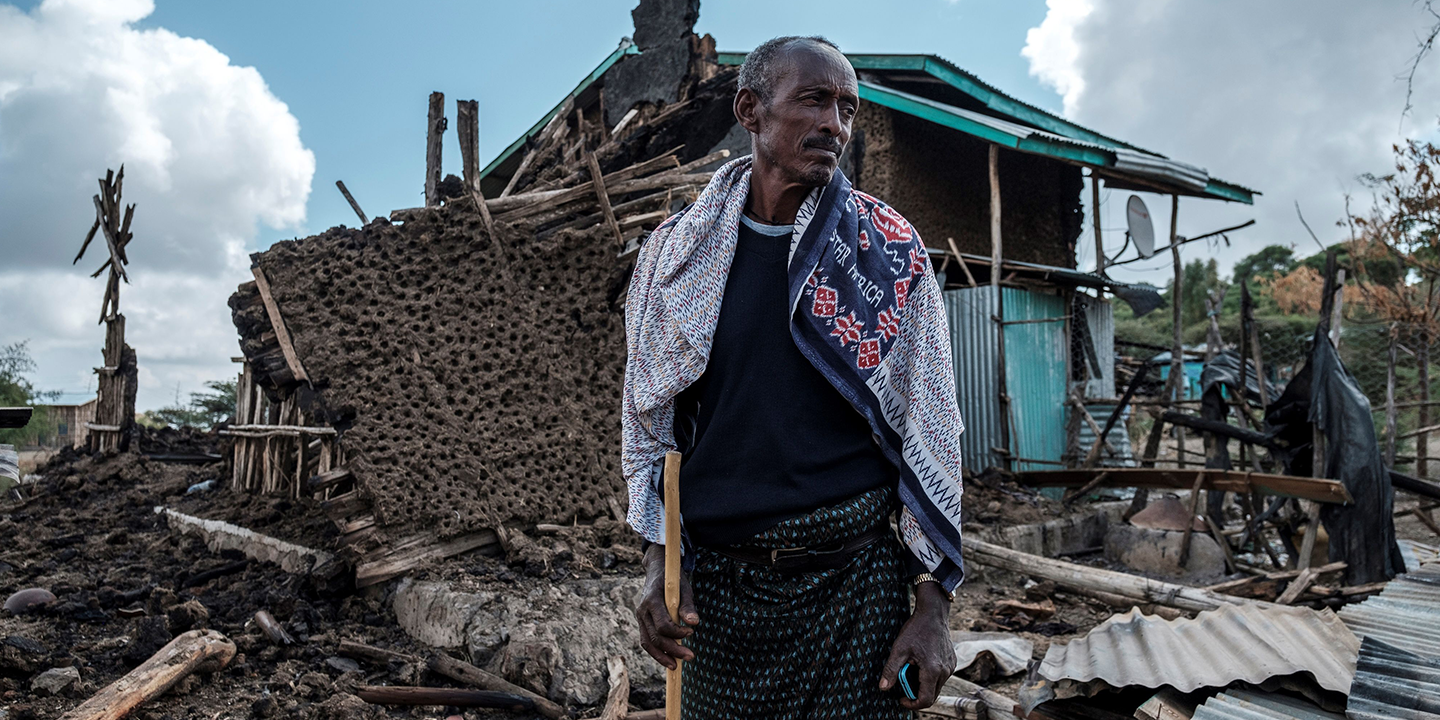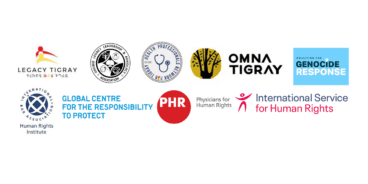

Atrocity Alert No. 233: Ethiopia, Yemen and Nigeria
Atrocity Alert is a weekly publication by the Global Centre for the Responsibility to Protect highlighting situations where populations are at risk of, or are enduring, mass atrocity crimes.
New eyewitness reports of ethnic killings in Ethiopia’s Tigray region
Despite Prime Minister Abiy Ahmed declaring an official end to the fighting in Ethiopia’s northern Tigray region on 28 November, there has been continued violence around Mekelle, Sherero, Axum and Abiy Addi, as well as along the regional border between Amhara and Tigray. Since 4 November the conflict has displaced more than one million people, at least 50,000 of whom have fled to neighboring Sudan.
On 9 December the UN High Commissioner for Human Rights, Michelle Bachelet, issued a statement calling for urgent monitoring of the human rights situation in Tigray and accountability for alleged violations. The statement corroborated reports of ethnic profiling of Tigrayans, including harassment and hate speech. High Commissioner Bachelet also stated that “such discriminatory actions are deeply unjust but are also fostering divisiveness and sowing the seeds for further instability and conflict.”
On 11 December the UN High Commissioner for Refugees, Filippo Grandi, expressed alarm about the situation facing almost 100,000 Eritrean refugees trapped in Tigray. High Commissioner Grandi highlighted an “overwhelming number” of reports that refugees had been killed or forcibly returned to Eritrea where they could face persecution. The refugees have also been cut off from life-saving assistance since the fighting in Tigray first began in early November. Although the federal government and the UN signed an agreement to allow the resumption of humanitarian aid on 2 December, the government claims insecurity has hampered access, with the Tigrayan capital of Mekelle only receiving its first convoy of medical supplies on 12 December.
As the communications blackout in the region has slowly been lifted, fresh reports have emerged of war crimes and other violations and abuses of human rights, including eyewitness accounts of the massacre of hundreds of people in Mai-Kadra on 9 November. Survivors recount a systematic, planned attack against ethnic Amhara civilians by Tigrayan youth groups, local police and militias. Meanwhile, in Sudan, ethnically Tigrayan refugees from Mai-Kadra reported attacks on ethnic Tigrayans perpetrated by Ethiopian government forces and an allied Amhara militia in Mai-Kadra at the same time as the massacre of Amhara civilians. Amnesty International’s Ethiopia Researcher, Fisseha Tekle, has stated that Mai-Kadra may only be the “tip of the iceberg” with details emerging of ethnic targeting and other attacks on civilians in Humera, Dansha and Mekelle.
The Ethiopian government must ensure unfettered humanitarian access to all vulnerable populations in Tigray. Refugees and other displaced persons must also be protected, in keeping with international law. All reports of war crimes and other violations and abuses of human rights should be properly investigated and the perpetrators held accountable, regardless of their position or affiliation.
2 years since Stockholm Agreement, Yemeni civilians continue to suffer
Sunday, 13 December, marked two years since parties to the conflict in Yemen signed the Stockholm Agreement. At the time, the agreement was hailed as a diplomatic breakthrough that prevented a military escalation in Hodeidah governorate and helped alleviate the suffering of Yemeni civilians. In addition to prisoner exchanges and steps towards de-escalation in Taizz, parties committed to a ceasefire in Hodeidah governorate, enabling the return of thousands of displaced civilians and the resumption of critical humanitarian aid deliveries across the country.
However, despite initial signs of promise, civilians have continued to endure widespread violations of international law. According to the Norwegian Refugee Council, at least 5,267 civilians have been killed or maimed in Yemen since December 2018, with 1,294 casualties in Hodeidah alone. Indiscriminate attacks have escalated during 2020, causing civilian casualties to almost triple since May.
In recent weeks hostilities in both Hodeidah and Taizz governorates have continued to increase, forcing hundreds of families to flee as residential areas are shelled and the delivery of humanitarian aid is systematically obstructed. At least 230 civilians, including 30 children, were killed or maimed during October due to renewed fighting – the highest monthly casualty count since September 2019. Eleven children, and dozens of other civilians, have been killed or maimed by indiscriminate shelling so far during December.
In a press statement on 14 December, the UN Security Council (UNSC) condemned increased fighting in Marib, Hodeidah and Taizz governorates and called for implementation of the global ceasefire call detailed in UNSC resolution 2532.
Jahaan Pittalwala, Research Analyst at the Global Centre for the Responsibility to Protect, emphasized that, “recent violence in Hodeidah not only threatens the viability of the ceasefire but also the delivery of life-saving aid to millions of vulnerable Yemenis. Preserving the ceasefire and the delivery of humanitarian goods is more crucial than ever given that at least 16,500 people in Yemen are already living in famine-like conditions.” All parties to the conflict should fully implement the Stockholm Agreement and must end ongoing attacks on civilians.
300 students still missing after gunmen attack school in Nigeria
An estimated 333 boys remain missing after gunmen attacked a school in the town of Kankara, in Nigeria’s northwestern Katsina State, on 11 December. A group of men on motorcycles, armed with AK-47s, stormed the Government Science Secondary School and marched hundreds of students into the surrounding woods. It is unclear how many of the missing boys are hiding in the remote forest or are still being held by the armed group. On Sunday, 13 December, UN Secretary-General António Guterres called for “the immediate and unconditional release of the abducted children” and urged the Nigerian authorities to bring those responsible to justice.
The armed extremist group Boko Haram has reportedly claimed responsibility for the attack. If true, it would mark their first major operation in northwest Nigeria. The attack took place in a state where criminal armed groups, known locally as “bandits,” are active. Since early 2019 armed banditry in Zamfara, Kaduna, Katsina, Sokoto and Niger states has displaced more than 160,000 people. Despite efforts by the security forces, bandits have killed more than 1,100 people in rural areas during 2020. While bandits in Katsina State are known to carry out kidnappings for ransom, they have not previously perpetrated an attack on this scale.
The Regional Director for West and Central Africa of the UN Children’s Fund, Pierre Poirier, said that last Friday’s attack “is a grim reminder that abductions of children and widespread grave violations of children’s rights continue to take place in northern Nigeria.” Kidnappings have become increasingly common, with children often being the target of armed groups. In the most notorious incidents, during 2014 Boko Haram abducted more than 270 girls in the town of Chibok and more than 100 girls in the town of Dapchi in 2018.
While the Minister of Defense has indicated that a rescue operation is underway, President Muhammadu Buhari has faced criticism for the security forces’ inability to provide civilians with adequate protection from armed groups. On Monday the parents of some of the missing boys took to the streets to pressure the government to increase their efforts to rescue the boys. The campaign hashtag #BringBackOurBoys has also been trending on social media.
Nigeria is currently facing multiple security threats that leave civilians at risk of atrocity crimes, but armed groups – including bandits and Boko Haram – are unlikely to be defeated by counter-terrorism operations alone. The government needs to comprehensively address structural issues of poverty, corruption, youth unemployment and environmental degradation that are exploited by armed groups to recruit and grow.

